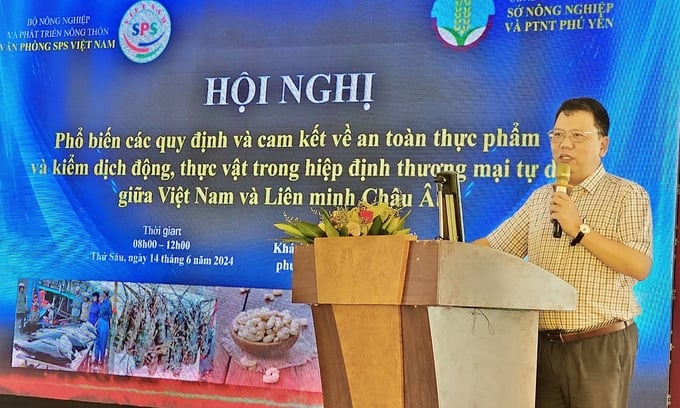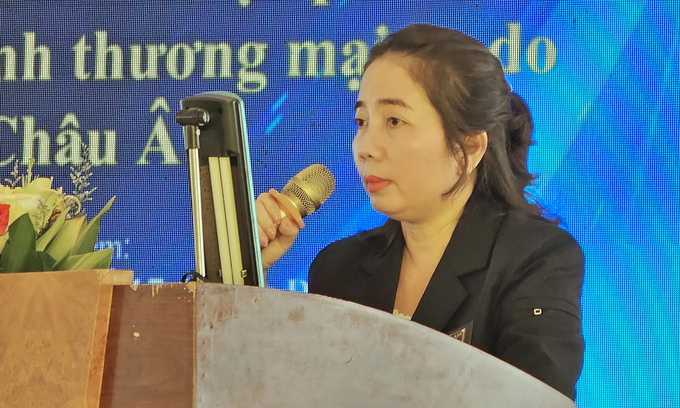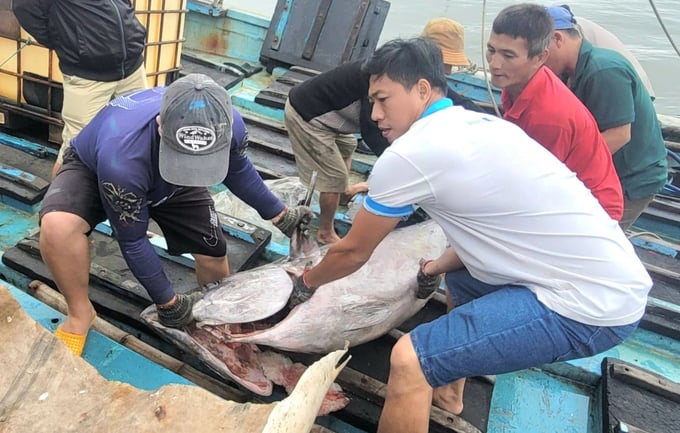May 20, 2025 | 17:56 GMT +7
May 20, 2025 | 17:56 GMT +7
Hotline: 0913.378.918
May 20, 2025 | 17:56 GMT +7
Hotline: 0913.378.918

Mr. Ngo Xuan Nam: The EU is not fastidious, but its regulations are strict and complicated.
At the Conference on Disseminating Regulations and commitments on food safety and animal and plant quarantine (Sanitary and phytosanitary - SPS) in the EVFTA, Mr. Ngo Xuan Nam announced that the EU has just given a "gift" to Vietnam, which is to remove instant noodles from food safety control.
Analyzing the cause, Mr. Nam said that the EU side highly appreciates Vietnam's efforts, including the participation of businesses, management agencies, and food safety control systems... This shows that In the past 6 months, instant noodle products have not had any violating shipments.
"For a long time, we have considered the EU market difficult. EU regulations are stringent and detailed. Exported products must meet hundreds of regulations, but not all businesses do. There is a specialized department in charge of this task," Mr. Nam said.
The leader of the Vietnam SPS commented that the EU's removal of food safety control proves that this market is not as "fastidious" as previously thought. Also, according to Mr. Nam, the fact that agricultural products are warned is something that many exporting countries in the world encounter. The problem is that each country must self-inspect, review, and evaluate the monitoring system following WTO practices and the importing country's standards.
Mr. Pham Trung Thanh, Head of Foreign Affairs Department of Acecook Vietnam Joint Stock Company, agreed with this opinion. According to Mr. Thanh, the EU's removal of control over Vietnamese instant noodle products is extremely good news for Vietnamese instant noodle manufacturing and exporting businesses.
"This shows the efforts of Vietnamese manufacturers, along with the close and effective companionship and guidance of state management agencies under the Ministry of Agriculture and Rural Development, represented by the Vietnam SPS, Ministry of Industry and Trade, Ministry of Science and Technology. I think the confidence of EU importers in Vietnamese agricultural products is increasing," Mr. Thanh expressed.
Acecook has strengthened and maintained strict control of input materials to meet EU requirements, applying modern international standard management tools to the production line. In particular, the company improves the quality of input supply chains and products to meet standards.
"From Acecook's experience, businesses that want to export products to the EU must closely follow market requirements. When participating in EVFTA, tariff barriers are almost gone, but we must face technical barriers. Enterprises must understand correctly and clearly because even a small mistake can cause the industry to face difficulties," Mr. Thanh continued.

Mrs. Dang Thi Thuy: The locality is still confused with SPS regulations.
As a major agricultural export locality, Phu Yen province has strengths in tuna and lobster products. Information at the conference on the morning of June 14, Deputy Director of the Department of Agriculture and Rural Development of Phu Yen province, Mrs. Dang Thi Thuy, assessed that the locality has a coastline of 189km, and rich aquatic resources with more than 50 rivers.
"Recently, the province's agricultural sector has mobilized all resources to develop a modern, sustainable agricultural economy with high added value, to improve farming efficiency associated with protecting aquatic resources, prevent IUU fishing," she said.
Despite large exports, some businesses in Phu Yen province still do not clearly understand SPS regulations, according to Mrs. Thuy. Leaders of the Department of Agriculture and Rural Development admitted that standardizing raw material areas and controlling pesticide residue levels still confuses production facilities.
Mr. Luong Ngoc Quang, specialist in the Department of International Cooperation and Communications, Department of Plant Protection, emphasized that transparency in information and quality is one of the most essential requirements when exporting agricultural products. food entering the EU market.
For the EU market, all shipments must meet the requirements that the product is not on the list of products banned or temporarily suspended from import into EU countries, Not infected with EU plant quarantine objects, and not infected with other pests.
In addition, a Plant Quarantine Certificate issued by a competent authority is required. Additionally, wooden packaging materials must meet the international standard guide for wood packaging (ISPM-15).
"The EU is especially concerned about fruit flies on fruit and vegetable products. In addition, when exported to the EU, fresh fruit products, cashew nuts, coffee, etc. need to meet seed standards or equivalent applicable in the EU," Mr. Quang said.
Regarding seafood exports, Mr. Le Hoang Lam, Director of the Center for Quality of Agriculture, Forestry and Fisheries Region 3, announced that the EU recognizes Vietnam's food safety control system. The Department of Quality, Processing, and Market Development is the competent authority controlling seafood exports to the EU.
In addition to the general requirements, the EU also requires some additional issues, such as the exporting country must develop, implement, and have the EU recognize a national monitoring program on chemical and antibiotic residues in farmed seafood. Or bivalve mollusks must have a built and EU-recognized program to monitor the safety and hygiene of the harvest area.

Phu Yen is one of three provinces with Vietnam's most significant tuna exploitation output.
At the end of 2023, Vietnam exported the first official bird's nests to the Chinese market. Through this event, Mr. Pham Duy Khiem, Vice Chairman of the Vietnam Bird's Nest Association, proposed that the Ministry of Agriculture and Rural Development have more specific instructions on processes, procedures, and forms for exporting Vietnam's strong products to key markets.
In addition, Mr. Khiem acknowledged that the number of products with evaluation standards to complete the export process is relatively diverse and complex. Many associations and localities find it challenging to implement many guidelines. Therefore, he proposed that the Ministry of Agriculture and Rural Development specify the main standards an export product must meet when exported to China, the EU, or another market.
In recent times, updating and disseminating regulatory information to markets on food safety measures and animal and plant disease safety (SPS) is essential because every month, SPS Vietnam receives about a hundred notifications and drafts on changes to SPS measures, including drafts on changes in pesticide residue levels, veterinary drugs, quarantine objects, etc.
Regarding the EVFTA, Mr. Nam said updating and disseminating SPS regulations is very important because import partners will warn if violated. This will cause impact and damage to businesses and especially affect Vietnam's agricultural product industry and brand in the international arena.
In addition, Vietnam's export products are no longer simply cassava roots, sugarcane in the garden, or tuna caught from the ocean. That could be a bowl of fish noodle soup with Phu Yen flavor, according to Mr. Nam.
"Minister Le Minh Hoan has repeatedly wondered about the story of developing the industry in the direction of multi-value integration, shifting from production to agricultural economics. To do that, we need to improve the processing quality further, intense processing in products and a clear understanding of export markets," Mr. Nam shared.
Translated by Huong Giang

(VAN) Dong Thap farmers attained an average profit margin of 64% during the summer-autumn 2024 crop (first season), while An Giang and Kien Giang farmers followed with 56% and 54%, respectively.

(VAN) As a doctoral student doing research on renewable energy and electrification at Harvard University, the author shares his musings on electricity, nature, and countryside memories.

(VAN) The decree on Extended Producer Responsibility (EPR) ensures transparent management and disbursement of support funds, avoiding the creation of a “give-and-take” mechanism.

(VAN) Hue City rigorously enforces regulations regarding marine fishing and resource exploitation, with a particular emphasis on the monitoring of fishing vessels to prevent illegal, unreported, and unregulated (IUU) fishing.

(VAN) Hanoi People's Committee has issued a plan on reducing greenhouse gas emissions in the waste management sector with 2030 vision.

(VAN) Vietnam's draft amendment to Decree No. 156 proposes a mechanism for medicinal herb farming under forest canopies, linking economic development to population retention and the sustainable protection and development of forests.

(VAN) In reality, many craft village models combined with tourism in Son La have proven effective, bringing significant economic benefits to rural communities.